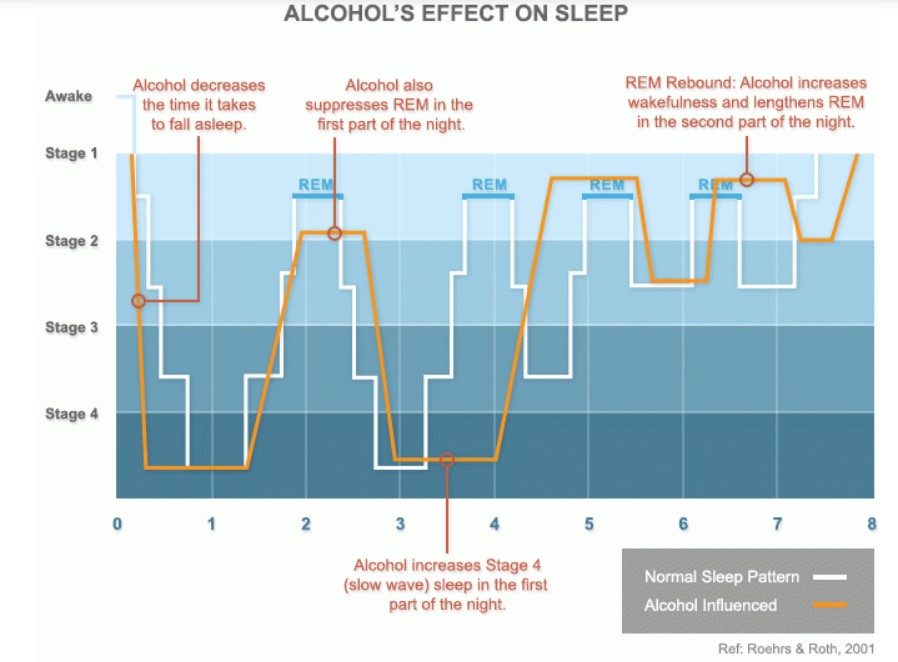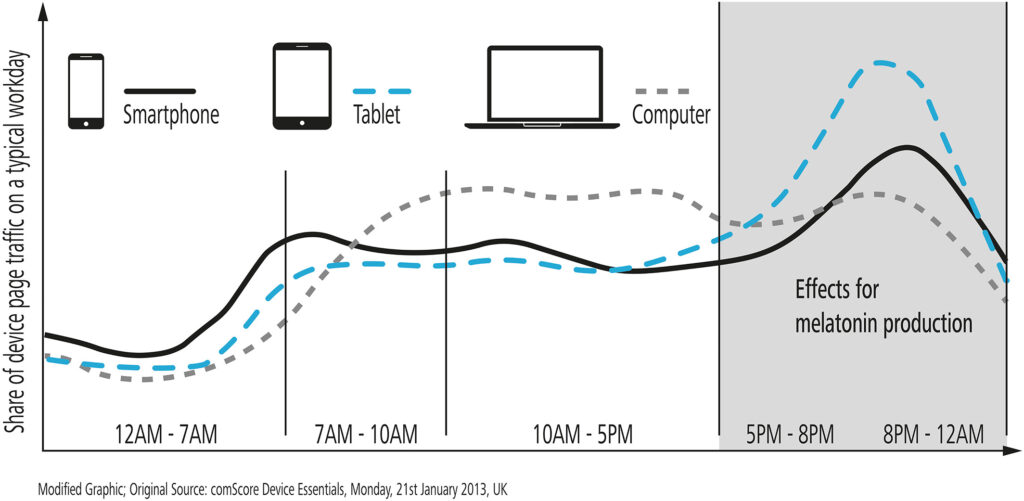- The association between meal timing and sleep.
- How alcohol and caffeine affect your sleep.
- Minimizing the impact of light on your sleep quality.
- Creating an environment that induces quality sleep.
- Drawing boundaries that limit stress before bedtime.
- What chronotype is and how it plays into your sleep schedule.
- Reducing the effects of sleep inertia in the morning.
Building a Bedtime Routine for Adults: 7 Tried-and-True Tips
Building a Bedtime Routine for Adults: 7 Tried-and-True Tips

- Finish your final meal of the day at least three hours before bedtime to allow your body enough time to digest the food and reduce the risk of nighttime heartburn.
- Stop drinking alcohol at least 3-4 hours before bed, as alcohol can disrupt your sleep-wake cycle and reduce the quality of your sleep.
- Reduce your exposure to bright lights and blue light in the evening. You can do this by having 30 minutes of device-free time before bed, setting up night mode on your devices, or using blue light-blocking glasses.
- Create a bedroom environment that cultivates good sleep. Invest in blackout curtains, keep your room temperature at 62-68 degrees Fahrenheit, and use your bedroom only for sleep and sexual activities.
- Avoid activities that induce stress at least an hour before bed. This might include checking your emails, replying to work messages, watching social media, or reading the news. Don't exercise an hour before bed, as this can increase your heart rate, body temperature, and adrenaline levels.
- You can reduce sleep inertia in the morning by having a hot drink, hydrating well, and performing at least 5 minutes of exercise. Getting at least 30 minutes of sunlight in the morning can also help regulate your body's circadian rhythm.
Re-Structuring Your Bedtime Routine and Habits for Better Sleep
The quality and quantity of sleep you get each night can impact multiple facets of your life, including your mental, emotional, and physical wellness. For instance, getting enough high-quality sleep can enhance your memory, cognitive performance, weight loss, and glucose control.
If you miss some distressingly small amount of sleep for the night, the next day you will handle glucose the same way a diabetic does.
Tom Bilyeu
Because of the paramount importance of sleep, each individual should cultivate habits that improve how well they sleep. The following are some tips on how to build a healthy evening routine before bed.
Tip #1: Watch Your Meal Timing
Eating too close to bedtime can affect your digestion and ability to sleep. It can also contribute to nighttime heartburn or reflux. This happens when your stomach acid goes back up the esophagus and causes a burning sensation that disrupts sleep. Ensure that your last meal is at least three hours before bed to allow your body enough time to digest the food.
Tip #2: Avoid Alcohol and Caffeine Before Bed
Alcohol fragments and disrupts your sleep architecture and suppresses rapid eye movement (REM) sleep, which is the mentally restorative phase of sleep.

Source: https://campushealth.unc.edu/health-topic/substances-and-sleep/
If you wish to drink alcohol, keep these tips in mind:
- Have alcohol as early on as possible in the day.
- Drink plenty of water after having alcohol.
- Have a personalized drinking limit so you don’t overindulge.
- Stop drinking at least 3-4 hours before bedtime.
Apart from alcohol, it’s also crucial to monitor your caffeine intake. Self-experiment to see how quickly your body metabolizes caffeine and set yourself a cut-off time for drinking caffeinated beverages.
Tip #3: Minimize the Impact of Light on Your Sleep
How you expose yourself to light can either disrupt or help regulate your circadian rhythm, which is the 24-hour internal clock that governs the cycle of wakefulness and sleepiness.
Taking in too much bright light or blue light before bed can give your brain the wrong signal that it’s not time to sleep. Science has also shown that blue light suppresses the production of melatonin. This hormone is naturally secreted by the brain in response to darkness, which helps keep your sleep-wake cycle in check.
What the researchers found is that for every hour you’re on your device at night, this suppresses melatonin for about 30 minutes.
Shawn Stevenson, Nutritionist
The following are some steps you can carry out to minimize the impact of light on your sleep:
- Schedule 30 minutes of device-free time before bed.
- Dim the lights in the bedroom during the evening.
- Set your devices to night mode and dial down the brightness of your screens.
- Use blue light-blocking glasses when utilizing your devices at night.

Source: https://onlinelibrary.wiley.com/doi/10.1002/jbio.201900102
Tip #4: Make Your Bedroom a Sanctuary for Sleep
Optimizing your bedroom for sleep is a practical yet effective method of boosting your sleep quality. Since light can throw off your body’s natural sleep-wake cycle, you can use blackout curtains to keep your bedroom dark. Research has also discovered that cooling the room to 62-68 degrees Fahrenheit is ideal for sleep. It’s also best to train your brain to associate your bed with only sleep and sexual activity. If your bedroom is linked to watching TV, using your devices, getting work done, and other activities, being in bed will trigger these different channels of stimulation and keep your brain awake.
Also, try to avoid tossing and turning in bed for too long. If you happen to wake up in the middle of the night and cannot fall back asleep, consider getting out of bed and heading into another room to do something else that helps you relax. This can help your brain relearn the association between your bedroom and sleep.
Find whatever works for you, and then only when you’re sleepy do you return to bed; there’s no time limit for that. That way, you train the brain back out of a bad association that it’s learned, which is my bed is this place of being awake.
Matthew Walker, Neuroscientist
Tip #5: Draw Boundaries to Curb Stress
Building healthy personal boundaries around your bedtime can also help block out stress and preserve your sleep. Have a cut-off time of at least an hour before bed to check emails, read through texts, or even watch or read the news. If you need to work at night, leave the portion of work you enjoy the most toward the end of the evening.
Exercise is another stressor that raises your body temperature, heart rate, and adrenaline, making it harder to doze off. Thus, it’s best to avoid exercising too close to bedtime.
Tip #6: Stick to a Routine
Your chronotype refers to the natural inclination of your body to sleep at a certain time. Adjust your sleep schedule based on your chronotype, and stick to this routine as closely as you can each day. A consistent sleep schedule can help with the regulation of your circadian rhythm.
Tip #7: Enjoy the Company of People You Love
Loneliness and social isolation can contribute to insomnia and sleeping problems. So, during the evening, dedicate a portion of your time to spending it with people you love and enjoy. You can share a conversation with a friend, connect with your children and family members, or spend time with your partner.
Research has also found a strong association between sex and sleep because your body produces a cocktail of hormones, including oxytocin and prolactin, after an orgasm. These hormones induce feelings of pleasure and relaxation, which are helpful for sleep.
It doesn’t necessarily have to be a romantic relationship, though I do very much encourage that. But having close friends that you can love and laugh with makes a huge difference. Loneliness has as strong of a negative impact on your longevity as smoking 15 cigarettes a day.
Tom Bilyeu
How to Reduce Sleep Inertia When You Wake
Sleep inertia refers to the grogginess, disorientation, and drowsiness a person feels when they first wake up. Apart from optimizing your sleep quality, there are some ways you can reduce sleep inertia in the morning:
- Program your thermostat to raise the room temperature in the last hour of your sleep.
- Program your smart lights to gradually turn on as you wake up to imitate sunrise.
- Have a hot drink to increase your body temperature after waking up.
- Build a habit of exercising for at least five minutes in the morning.
- Hydrate well in the morning.
- Head outside to get some sunlight.
- Set your sleep schedule according to your chronotype.
Building a healthy bedtime and morning routine is key to enjoying the benefits of good sleep. This will elevate your mental performance and physical wellness in the long haul.



